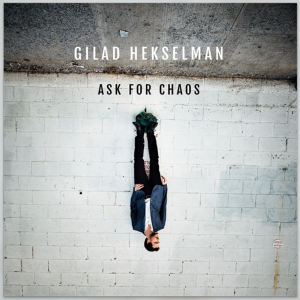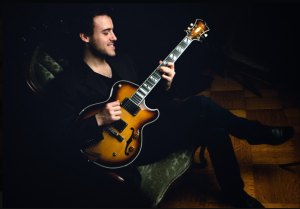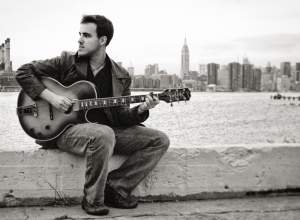[Mimmo]: How did you get started playing guitar and what prompted you to make the decision to move to New York?
[Gilad]: If you don’t mind, I’ll separate those two: I started playing guitar when I was 9 and have played piano since I was 6. I kept playing piano until I was 12, but the guitar was the first instrument that I got really into practicing. Before that I wanted to sing, actually, and I wanted to play the drums, but singing didn’t go so well, and the drums I had for a few days and my neighbors said I couldn’t do that anymore. The guitar was my next desired instrument; a lot of my neighbors played guitar, which made it a good environment to study guitar for sure.
New York has one of the largest and most intense music scenes in any genre, pretty much that I can think of. I wanted to be around that. I’ve visited a few times as a tourist when I was a kid. When I was 18 or 19 I was [in New York] for a couple of months and realized this is where I wanted to be; surrounded by greatness and study from it, play with people that I admired eventually, which slowly but surely happened after I moved here. You get access to all kinds of people and music that you don’t get access to anywhere else. So growing up in Israel I wanted to move here and get a little kick in the butt.

[Mimmo]: Since moving to New York, what have you noticed about the NYC music scene and what kind of opportunities have presented themselves throughout your time there?
[Gilad]: There’s such a great amount of people that are really serious about their craft or art form, whether it be jazz or any sort of art really. That’s why they come to New York, because they’re really serious about it and want to challenge themselves. You get the highest level here. If you just go and seek it, you can really have an endless source of inspiration and information.
[Mimmo]: With Ask for Chaos released: Describe how you approach to writing has developed since your first studio album and how it has evolved into what has become Ask for Chaos.
[Gilad]: It’s hard to describe how someone evolves…except that my goal is to become more and more myself. And myself is also something that changes, too, but there are some core things that don’t change in a person from when they’re kids through adulthood. Also your surroundings and the things you’re exposed to, they change who you are, musically-speaking, but also personally-speaking. Music represents who we are as people. So many things have happened since my first studio album, it’s hard to quantify them. People you get to play with, people you get to meet. I had a kid, changed apartments, changed guitars, had life experiences, all of that is reflected in the music. Ask for Chaos is just another snapshot of a time.
It is quite different from all my records. It’s the first time I’ve had piano and keyboard on. Also, two brand new bands; I had my trio with Joe Martin and Marcus Gilmore for many, many years [see Homes, This Just In, Hearts Wide Open, Words Unspoken, and Split Life]. Eventually I decided to change things up a little bit and also challenge myself to create new sounds. I think this record is a good representation of that. It’s a different sounding record from my other records.

[Mimmo]: How much of a role have guitar effects had on your writing process and overall style?
[Gilad]: Not a great role. Usually when I write a song it will be without any regard to who and how it’s going to be played. I just write the ideas in my head. Whether its a melody or a concept, whatever it is I will first write it. Sometimes then, eventually I will have to use effects to make that sound happen. Especially if you play in a trio with bass and drums, sometimes what I have in my head is much larger than that. We have to find ways to orchestrate it, whether it’s with acoustic instruments or using effects or looping to make it happen.
Specifically, one half of the record is by a band called Zuperoctave which is based on a concept that I’ve been doing in other people’s bands where there’s no bass player. I kind of cover the bass and guitar parts, and the pedal that started that journey for me was a pedal called “Super Octave” by BOSS. It’s the only pedal I knew of where you could start the octave at a certain frequency. You could actually dial in the frequency at which you want the octave to start dropping the octave. I was very excited about that because I’ve always wanted to expand the range of the instrument without losing the center of it. That started the journey and I thought it was time to start my own project with that concept, and Zuperoctave is that concept.
[Mimmo]:What is your current pedalboard set-up?
[Gilad]: The first one is a compressor by Old World Audio called 1960. A nice, subtle compression that mainly adds nice tone to the sound and a little bit of boost. Valetone Coral Mod, that’s like a mini multi-effect which I hardly use, but when I use it I don’t want, like 7 massive pedals with that. The next one is an EQ by a great Korean company that makes great guitars and great pedals. Then after that we go into the Super Ego by Electro-Harmonix which is basically a Freeze with some variation on some of the parameters. Then that goes into my volume pedal, which I can’t endorse fully since I just started using it. It’s a Bloomery Active Volume Pedal. It’s quite heavy, but it’s pretty sturdy. Then that goes into the Super Octave OC-3, which we just talked about.
If I don’t play the bass, the direct out goes into the Dunes by Earthquaker Devices, and that goes into a Deluxe Looper by Donner, which is kind of a cheap looper, but it’s kind of a small one and has a lot of nice functions, so I use that. If I do play with a band that I play the bass in then the Super Octave will split. One would go into the second input on the looper and one would go into the rest of the chain like before.
By the way, at the end of the normal chain, on the bass chain, is an Earthquaker Devices Avalanche Run which is like a delay and reverb in the same pedal. That’s it!

[Mimmo]: Being a Esperanza Spalding fan, I couldn’t help but notice you’ve features on Radio Music Society. How was that experience?
[Gilad]: It was great! Yeah, I’ve played with Esperanza quite a few times. This is the first time I’ve had a chance to be on her record, which was awesome. She made a demo and asked me to be on it a while ago, and I think for the record she has a different band. She really dug what I did on this one solo and she wanted me to come in to specifically do that.
[Mimmo]: What is some advice you’d like to give to guitarists that are aspiring to pursue a career of their own?
[Gilad]: Man. Practice and be smart about practice. Study music. Meaning actual music, not just theory. Check out records, go out to hear shows, transcribe a lot of music, learn a lot of songs. That at least has been my experience, those things really help you shape up as a musician. Of course, there’s room for technique and working on voicings, right-hand technique, blah blah blah, but it has to start from excitement about music.
Thanks for tuning into In The Spotlight with Gilad Hekselman. Stream his latest album, Ask for Chaos, on all major platforms!
If you’d like to be featured on Mimmotronics’ In the Spotlight send a message to mimmotronics@gmail.com.
